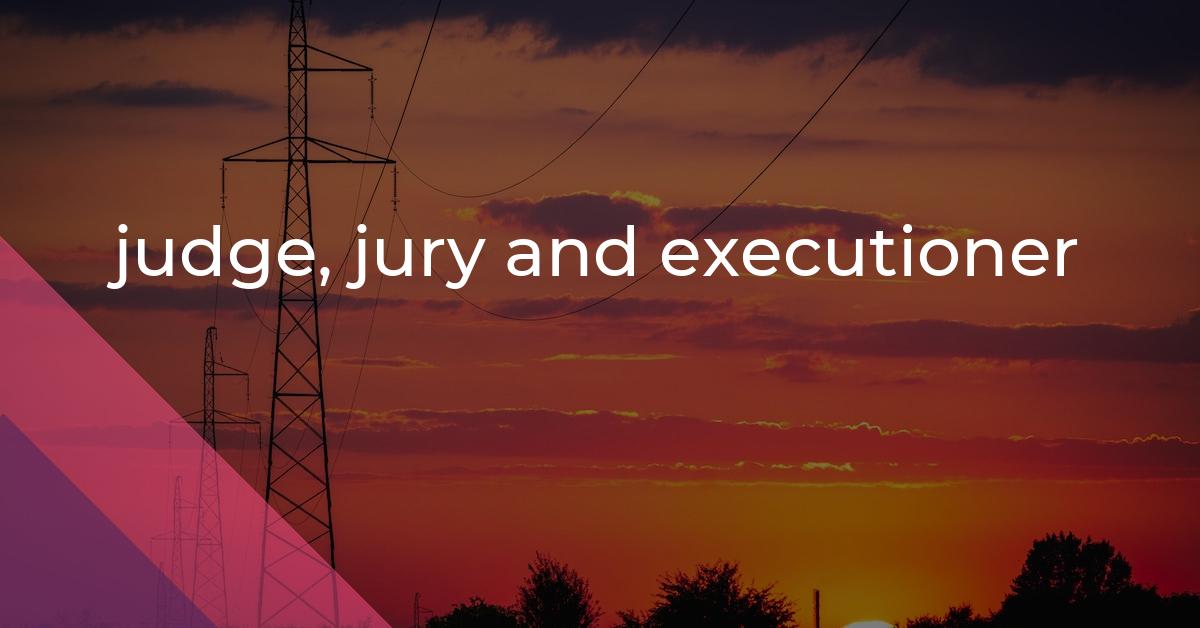judge, jury and executioner: Idiom Meaning and Origin
What does ‘judge, jury and executioner’ mean?
The idiom "judge, jury, and executioner" refers to a person who takes on multiple roles in a situation, unilaterally making decisions and carrying out their own form of justice without any oversight or input from others.

Idiom Explorer
The idiom *stand trial* means to appear in court as a defendant, where one's case is heard and a decision is made by a judge or jury.
The idiom "leave the ball in someone's court" means to give someone the responsibility or opportunity to take action or make a decision in a situation, often after one's own efforts or turn has been completed.
The idiom "jill of all trades" refers to a person who has a variety of skills or can perform multiple tasks competently.
The idiom "jack of all trades, master of none" refers to someone who has superficial knowledge or skills in many areas but is not exceptionally skilled or knowledgeable in any particular one.
The idiomatic expression "jack of all trades" refers to a person who possesses a wide range of skills and is competent in various areas or activities.
The idiom "in the dock" means to be on trial or facing judgment in a court of law. It is commonly used to describe someone who is accused of a crime or wrongdoing and has to defend themselves in a legal setting.
An idiom meaning to do something quickly and efficiently, often describing the completion of multiple tasks or actions in a single swift and decisive motion.
The idiom "hurler on the ditch" refers to someone who offers criticism or advice from a position of safety or inaction, without actively participating or taking any risks themselves.
The idiom "hold court" means to act in a way that demonstrates authority and attracts attention and admiration from others. It refers to a person commanding a high level of respect and being the center of attention in a social or professional gathering.
The Ultimate Authority
Judge, jury and executioner is an idiom commonly used in English language. This idiom is typically used to describe someone who has complete power and authority. They take on the roles of all three entities in a legal system: the judge, who decides the case, the jury, who weighs the evidence, and the executioner, who carries out the punishment. This person not only makes the decision but also enforces it, leaving no room for appeal or dissent.
The origin of this idiom can be traced back to the legal system, specifically to the concept of capital punishment or the death penalty. Historically, when a person was found guilty and sentenced to death, the executioner was responsible for carrying out the sentence. This role was distinct from that of the judge and jury, who were responsible for determining guilt or innocence and pronouncing the sentence in the first place.
The idiom "judge, jury and executioner" gained popularity outside of legal contexts and became more widely used metaphorically in the English language. In its metaphorical usage, the idiom suggests someone who not only has the power to decide a person's fate but also has the authority to carry out the consequences. The implication is that this person possesses unchecked power and may abuse it, bypassing the usual checks and balances of a fair and impartial system.
The idiom "judge, jury and executioner" is often used in discussions about individuals or entities who take on roles of absolute power and authority. It can be seen in various contexts, such as politics, business, or even personal relationships, where one person assumes the role of making all the decisions and enforcing them without any input or oversight from others. The idiom serves as a cautionary reference to such situations, highlighting the potential dangers of concentrated power and the absence of accountability.
The idiom "judge, jury and executioner" is related to the idiom "Daniel come to judgement". Just as someone who is referred to as "judge, jury and executioner" possesses complete power and authority, "Daniel come to judgement" refers to the situation where someone has the authority to make a final decision or judgement about something. Both idioms convey the idea of an individual or entity having the ultimate say in a matter, without the need for further input or review. The difference lies in the specific roles implied by each idiom. "Judge, jury and executioner" encompasses the entire judicial process, while "Daniel come to judgement" focuses on the final decision-making authority.
Another related idiom is "stand trial". This idiom is used to describe the process of a person appearing before a judge and jury to face legal charges. In the context of "judge, jury and executioner," the idiom "stand trial" can be seen as a precursor. It signifies the initial step in the legal process, where the person accused of a crime has the opportunity to present their case and defend themselves before the judge and jury. The idiom "judge, jury and executioner" would come into play after the trial, when a decision has been made and the consequences are enforced.
The idiom "judge, jury and executioner" is also connected to the idiom "jill of all trades". While "judge, jury and executioner" refers to someone who possesses complete power and authority, "jill of all trades" refers to someone who is versatile and skilled in multiple areas. Both idioms imply a person who can handle various responsibilities and roles. However, "jill of all trades" has a more positive connotation, suggesting adaptability and competence, whereas "judge, jury and executioner" carries a negative connotation of unchecked power and potential abuse.
Lastly, the idiom "hold court" is another idiom related to "judge, jury and executioner". "Hold court" refers to someone who is in a position of authority and control, where they gather a group of people and take command of a situation or discussion. This idiom aligns with the idea of someone acting as "judge, jury and executioner" in a non-legal context. It signifies someone who has the power to make decisions and enforce them, just like a judge presiding over a court.
The idiom "judge, jury and executioner" embodies the idea of an individual or entity possessing unfettered power and authority, encompassing the roles of decision-maker, evaluator of evidence, and enforcer of consequences. Its origins can be traced to the legal system, particularly the concept of capital punishment. However, its metaphorical usage extends beyond legal contexts, serving as a warning about the dangers of concentrated power and the absence of checks and balances. This idiom offers insight into the human tendency to seek absolute control and the potential consequences it may entail, reminding us of the importance of fairness, impartiality, and accountability.
Example usage
Examples of how the idiom "judge, jury and executioner" can be used in a sentence are:
1. After being caught stealing, the store manager acted as judge, jury, and executioner by firing the employee on the spot. 2. The vigilante believed he had the right to be judge, jury, and executioner, taking matters into his own hands without involving the police. 3. The dictator acted as the ultimate authority, playing the role of judge, jury, and executioner, deciding the fate of his political opponents.More "Justice" idioms



